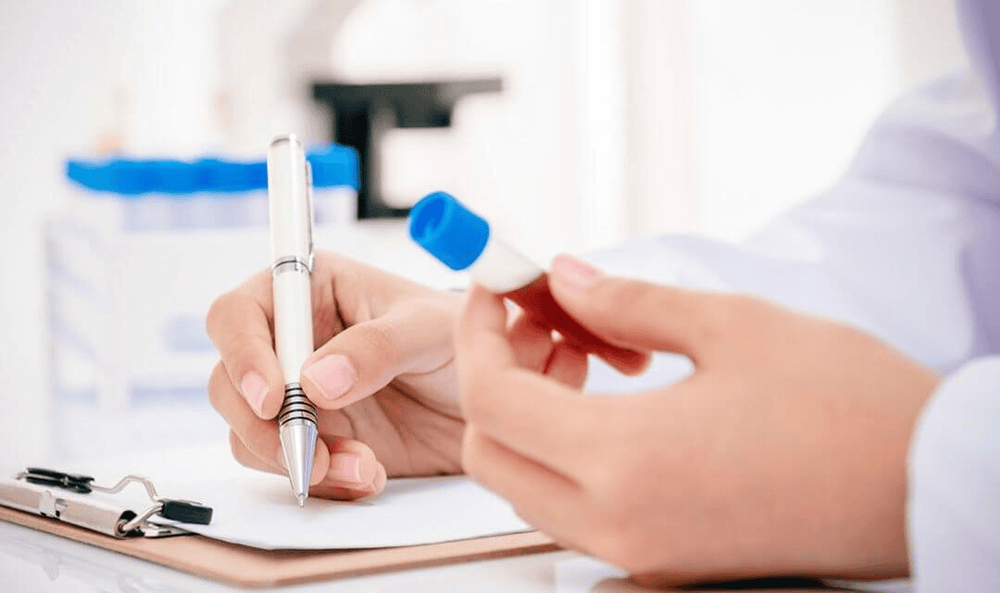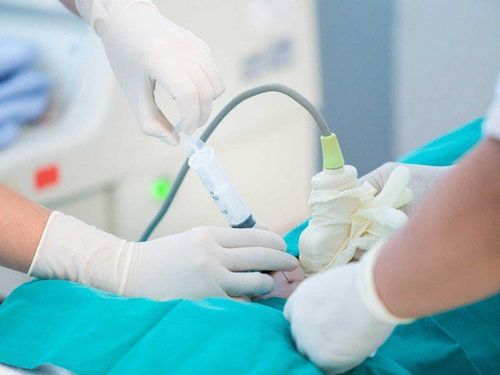This is an automatically translated article.
The article is professionally consulted by Specialist Doctor Department of Obstetrics and Gynecology - Vinmec Hai Phong International General Hospital.
The tests that need to be done during pregnancy will help pregnant women monitor the development of the fetus and take necessary interventions if adverse complications occur.
1. Why do tests during pregnancy?
All pregnant women are encouraged to have some of the necessary tests as part of their prenatal screening. Tests during pregnancy help pregnant women detect the risk of complications early for the mother and fetus, so that the doctor can have appropriate and timely treatment.
Trắc nghiệm: Bạn có hiểu đúng về dấu hiệu mang thai sớm?
Các dấu hiệu mang thai sớm không phải chỉ mỗi trễ kinh mà còn có rất nhiều dấu hiệu khác như xuất huyết âm đạo, ngực căng tức,… Điểm xem bạn biết được bao nhiêu dấu hiệu mang thai sớm thông qua bài trắc nghiệm này nhé!
2. What tests should be done early in pregnancy
The following laboratory tests should be performed early in pregnancy:
2.1. Complete blood count (CBC)
A complete blood count is one of the necessary tests during pregnancy that helps to count the number of different types of cells that make up the blood:
Red blood cell count: Indicates whether the patient is anemic or not. White blood cell count: Corresponds to the body's ability to fight disease. Platelet count: Related to blood clotting problems.
2.2. Blood group test
Blood group test results during pregnancy show whether the patient has Rh factor or not.
Rh factor is a protein normally present on the surface of red blood cells. Most people have the Rh factor, and these will be Rh positive (Rh+). People who do not have the Rh factor will have an Rh negative (Rh-) result. If the fetus is Rh+ while the mother is Rh-, the mother's body can make antibodies against the baby's Rh factor. These antibodies destroy the baby's red blood cells.

2.3. Urine test
Test the urine sample to detect the presence of red blood cells (to see if the patient has urinary tract disease and cause bleeding), white blood cells (to see if the patient has a urinary tract infection) urinary incontinence) and glucose (a sign of diabetes).
In addition, the amount of protein in the urine (proteinuria) is also considered and compared between early and late pregnancy. Elevated proteinuria is likely a sign of preeclampsia, one of the serious pregnancy complications that often occurs in the late stages or after the baby is born.
2.4. Urine sample culture
Urine sample culture is a test to do during pregnancy, helping to check for the presence of different types of bacteria in the urine, thereby providing a basis for early identification of a urinary infection.
2.5. Rubella test
Rubella can cause birth defects in an unborn baby if the mother has been infected before during pregnancy.
In the rubella test, the doctor will take a blood sample of the pregnant woman to check if there are already antibodies against this disease in the blood. If a pregnant woman has never had rubella before or has not been vaccinated, it means that she does not have antibodies to fight rubella. In this case, pregnant women should avoid anyone who is sick because the spread of rubella is quite high.
On the other hand, women should not get the rubella vaccine while they are pregnant. Therefore, if a pregnant woman has not been vaccinated against rubella, it should be given soon after the baby is born, even while breastfeeding.
2.6. Testing for hepatitis B and hepatitis C
Women infected with hepatitis B and hepatitis C viruses during pregnancy have the potential to transmit the virus to their unborn baby. All pregnant women should be tested for hepatitis B virus infection. As for hepatitis C virus testing, it should be done if the mother has certain risk factors.
2.7. Testing for sexually transmitted infections (STIs)
Pregnant women should be tested for syphilis and chlamydia at an early stage. Syphilis and chlamydia can cause complications for you and your baby. If you have one of these diseases, you will be thoroughly treated.
If you have risk factors for gonorrhea (women under 25 or live in an area where gonorrhea is common), pregnant women should also be tested for gonorrhea.

HIV test is one of the tests to do during pregnancy. If a pregnant woman has HIV, she is more likely to pass the virus on to her unborn baby. HIV attacks the cells of the immune system and causes acquired immunodeficiency syndrome (AIDS). In case the woman is pregnant and infected with HIV, the patient should be prescribed medication and follow the instructions to significantly reduce the risk of HIV transmission to the baby during pregnancy, labor or give birth to.
2.9. Tuberculosis (TB) test
Pregnant women who are at high risk for TB (eg, women who have HIV or live and live in close contact with someone who has TB) should get tested for the disease.
2.10. Zika virus screening test
If you have traveled or worked in areas with Zika virus infection, you will need to be screened for the virus.
3. What tests to do in the later stages of pregnancy
The following tests should be done in the later stages of pregnancy:
3.1. Repeat Total Blood Cell Analysis
Pregnant women need to repeat the Total Blood Cell Analysis test to monitor their health status.
3.2. Rh . antibody test
If the pregnant woman is Rh negative (Rh-), the doctor will order a blood test to continue to check for the presence of Rh antibodies between 28 weeks and 29 weeks of pregnancy. If the Rh result is still negative, the pregnant woman will receive an injection of Rh immunoglobulin. This injection inhibits the production of Rh antibodies for the rest of the pregnancy. However, if the results show a positive Rh factor (Rh+), the mother needs special care.

3.3. Glucose tolerance test
This is one of the pregnancy tests to measure the glucose (sugar) level in a woman's blood. If the glucose level is too high, it is more likely that the mother has gestational diabetes. A glucose tolerance test is usually done between week 24 and week 28 of pregnancy. However, if you already have risk factors for diabetes or have had gestational diabetes in a previous pregnancy, testing may be done as early as the first trimester.
3.4. Group B strep test
Group B streptococcus is a group of bacteria that live in the vagina and rectum of women. Many people infected with these strains of bacteria do not show any symptoms, but these harmful agents can be passed to the fetus during birth.
Most babies who get this strain of bacteria from their mothers have no problems. However, in some cases, it can lead to serious complications, even death, in babies. Group B strep is usually detected through routine screening between 35 and 37 weeks of pregnancy.
If the group B strep test result is positive, your doctor may prescribe it for the pregnancy. Women take antibiotics during labor and delivery to prevent the possibility of passing the infection on to the baby.
4. Screening tests and diagnostic tests for birth defects in the fetus

Fetal malformation screening test is used to assess the risk that the fetus may have some common birth defects, related to genetic disorders. Screening tests can't accurately tell if a baby really has a birth defect.
On the other hand, diagnostic testing for birth defects is capable of accurately detecting many birth defects caused by defects in genes or chromosomes. Diagnostic testing for fetal malformations may be used instead of screening in cases where the couple has a family history of birth defects, belongs to a certain ethnic group with a genetic abnormality, or has previously have a child with a genetic birth defect.
Fetal malformation screening begins with an assessment of the mother's risk factors. Early in pregnancy, during the exam, the doctor will mention a number of risk factors, such as personal or family history of birth defects, the age of the mother 35 or older, or have pre-existing diabetes.
Tests to screen for birth defects in the fetus include: Ultrasound combined with blood tests to measure the levels of certain substances in the mother's blood.
Diagnostic tests for birth defects in the fetus include: Amniocentesis, chorionic villus sampling and targeted ultrasound.
5. What is a carrier test?
Carrier testing is done on a couple with a history of genetic disease to determine who is the carrier of the disorder gene. This test is usually done before or during pregnancy by taking a blood sample, which tells us if the baby is at risk for genetic disorders.
6. Selection of birth defects test
Testing for birth defects is one of the necessary tests during pregnancy. Usually, the screening or early diagnosis of birth defects in the fetus depends on the individual wishes of the parents. However, if parents know in advance that the baby will have a congenital disorder, the parents can consider the decision to terminate the pregnancy. Furthermore, if the pregnancy continues, parents can spend more time preparing best for the birth of a baby with a particular disorder. Besides, the doctor can also prepare a plan for the necessary medical care and treatment for the baby right after birth.
The Package Maternity Care program at Vinmec International General Hospital always provides pregnant women with prenatal screening test services and fetal malformation screening for accurate, fast and accurate results. Safe for mother and baby.
To find out about Vinmec maternity packages, you can contact the hospitals and clinics of Vinmec health system nationwide
Please dial HOTLINE for more information or register for an appointment HERE. Download MyVinmec app to make appointments faster and to manage your bookings easily.
Reference source: Acog.org













